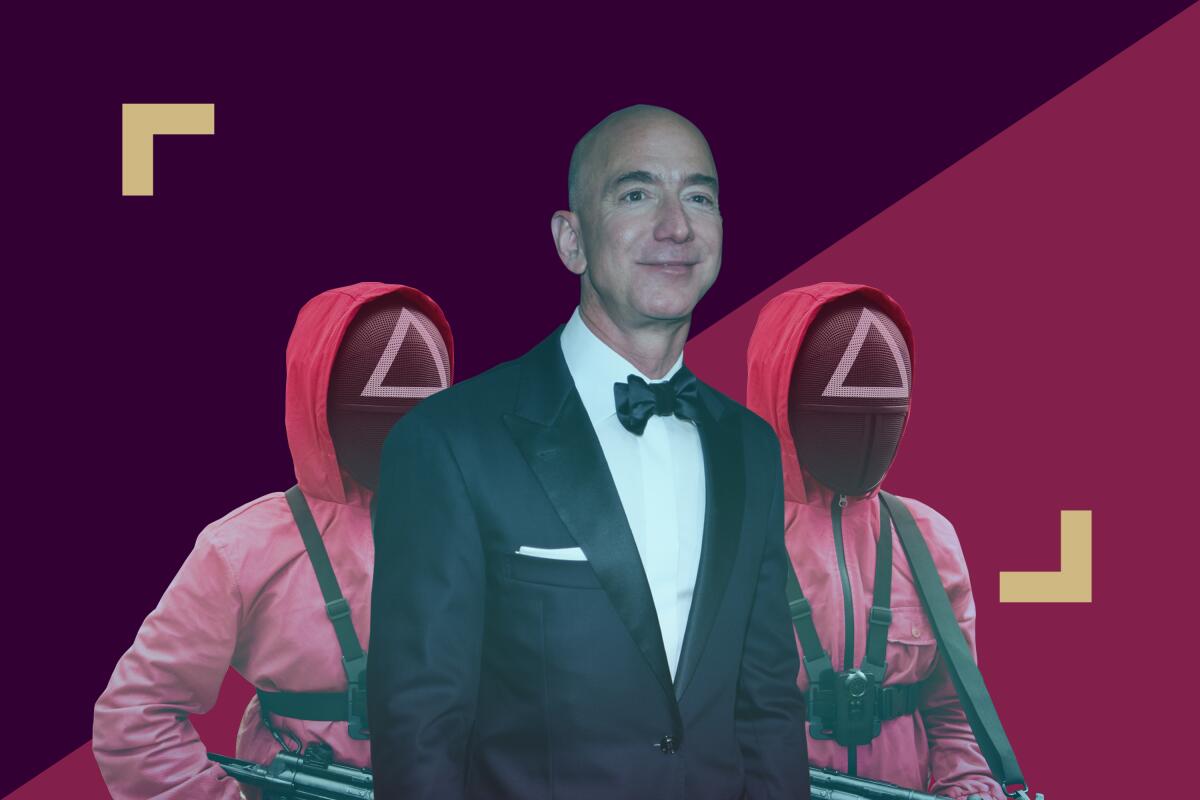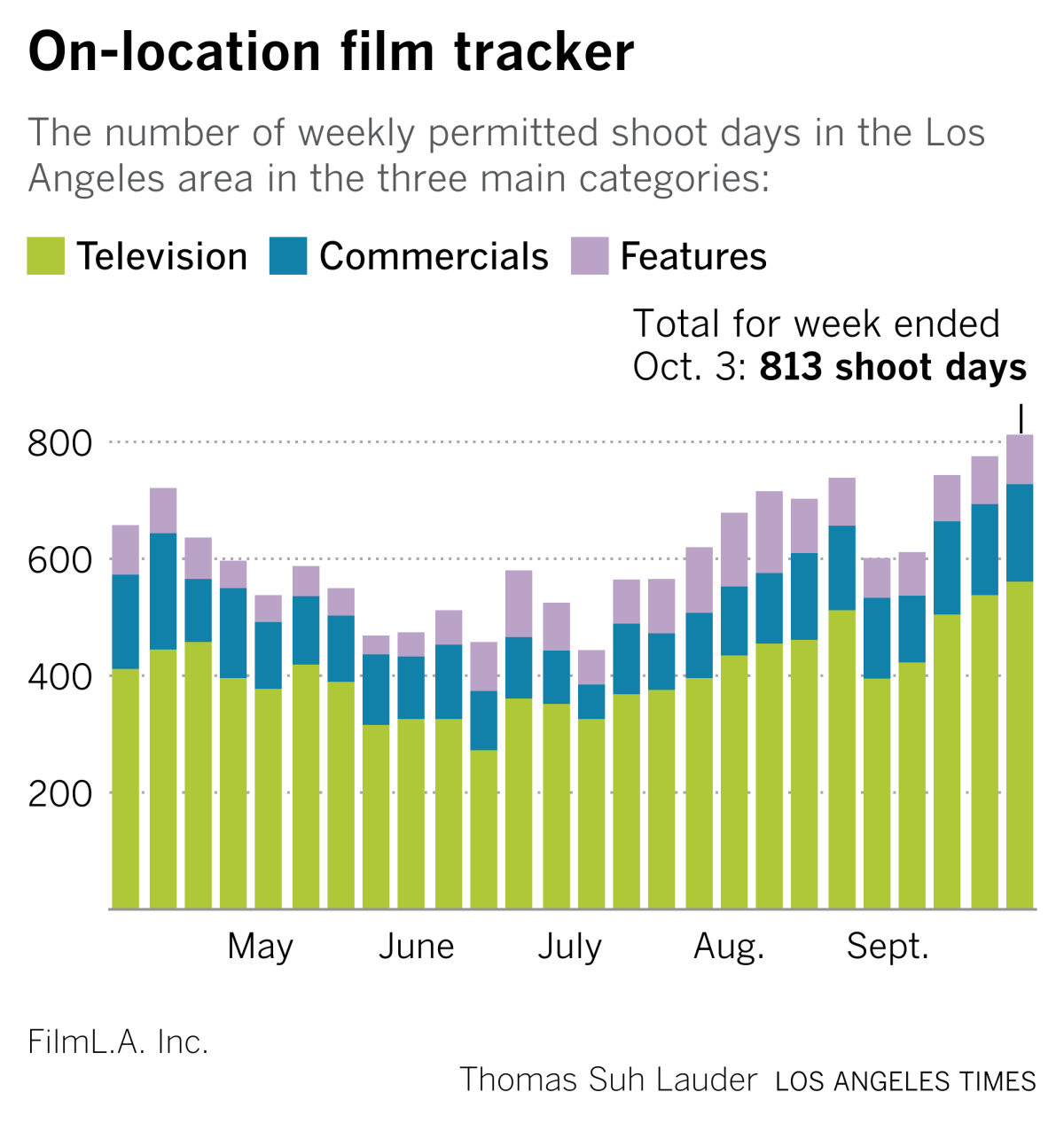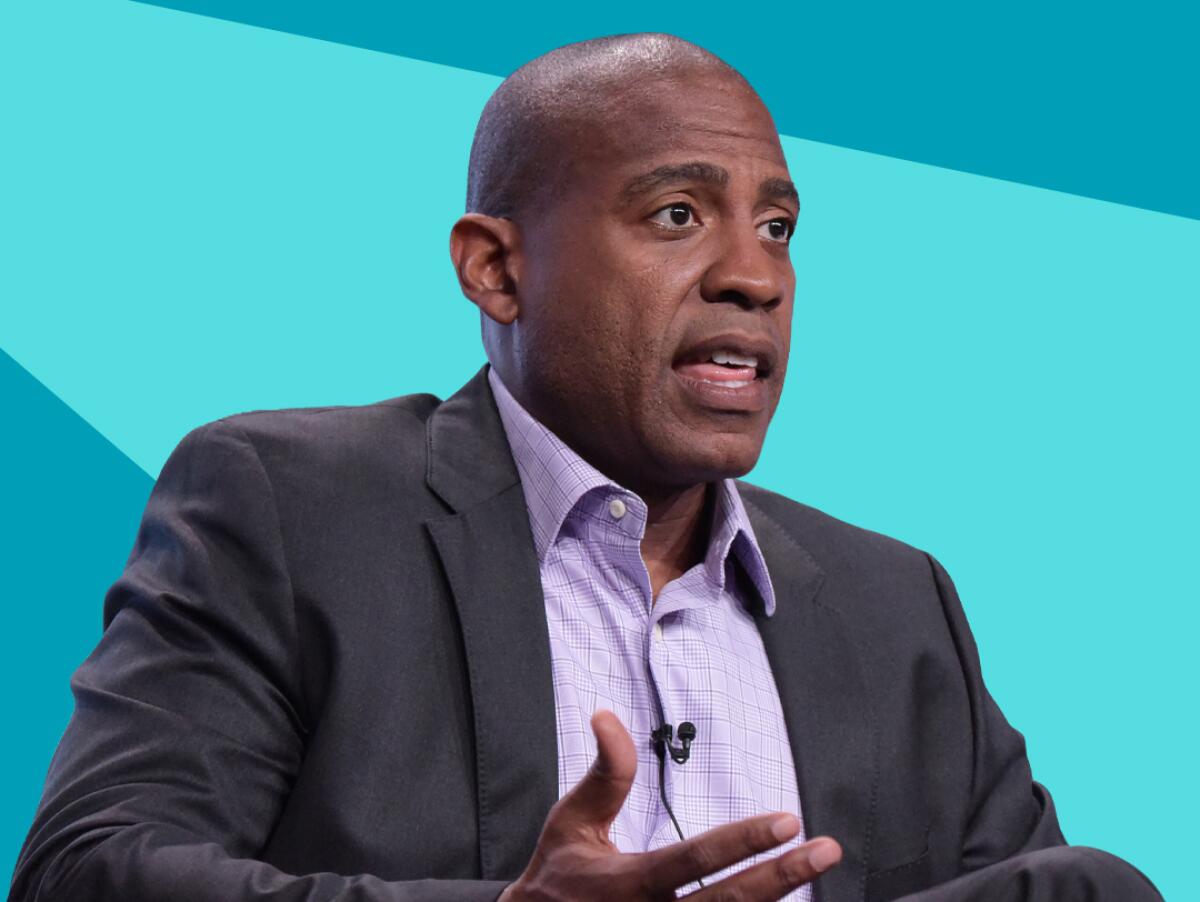Netflix’s ‘Squid Game’ validates its global streaming strategy. Just ask Jeff Bezos

- Share via
This is the Oct. 5, 2021, edition of the Wide Shot, a weekly newsletter about everything happening in the business of entertainment. Sign up here to get it in your inbox. If you’re enjoying the Wide Shot, tell us. Or better yet, tell your friends.
It’s been a remarkable few weeks for Netflix.
Reed Hastings and Ted Sarandos emerged from September as kings of the Emmys, with the streamer winning 44 prizes to top all rivals, including HBO.
Netflix, which rarely makes major acquisitions, continued its aggressive push for dominance by making two intriguing deals in successive weeks, announcing the purchase of late author Roald Dahl’s catalog and the Glendale-based game company Night School Studio.
But the biggest sign of Netflix’s growing global clout may be the unexpectedly successful launch of “Squid Game,” a dystopian South Korean drama series that now holds the top spot on the streamer’s most-watched charts in the U.S., beating “Seinfeld” and the documentary “Britney vs Spears.” “Squid Game” has been No. 1 since Sept. 21.
The brutal show went viral after its Sept. 17 premiere, producing innumerable memes that, like so many things on social media, are incomprehensible to anyone not in the know.
Perhaps most surprisingly, the series’ unexpected popularity even caught the attention of rival Jeff Bezos, who raised eyebrows over the weekend when he shared his praise of Hastings and Sarandos on Twitter.
“Their internationalization strategy isn’t easy, and they’re making it work,” Bezos tweeted. “Impressive and inspiring. (And I can’t wait to watch the show.)”
The post sparked speculation over whether this was a prelude to something bigger — perhaps an offer from Amazon to buy Netflix?
“Something’s up,” tweeted Franklin Leonard, founder of the Black List.
To clarify, Bezos answered: “No, just simple admiration.” (For what it’s worth, if you thought Amazon was going to get regulatory heat for its MGM deal, just imagine what would happen if it went after Netflix.)
It’s not uncommon for billionaires and executives to publicly pat one another on the back. Sarandos has spoken admiringly of Disney+, for example. Virgin Galactic’s Richard Branson tweeted his congratulations to Bezos for his Blue Origin space flight.
Still, the embrace of “Squid Game” is a clear validation of Netflix’s approach to global productions, after previous successes with non-English-language shows including “Money Heist” (Spain), “Who Killed Sara?” (Mexico) and “Barbarians” (Germany).
Sarandos told Kara Swisher at Vox Media’s Code Conference that “Squid Game” could deliver record viewership for the service, in any language.
“‘Squid Game’ will definitely be our biggest non-English-language show in the world, for sure,” he said. “It’s only been out for nine days, and it’s a very good chance it’s going to be our biggest show ever.”
Chalk up another win for global TV head Bela Bajaria, who has played a key role in helping Netflix generate large audiences for its non-English-language original series, including dramas and reality shows. Netflix has made shows in 40 countries, and 97% of its U.S. subscribers watched at least one non-English title in the last year, as my colleague Wendy Lee recently wrote.
“We just want shows to represent the world as it is,” Bajaria told Lee about the international push. “I think local executives in these countries matter, understanding the creative community, understanding the audience — that matters.”
The global focus makes sense, given that only 35% of Netflix’s subscribers are from the U.S. and Canada and that most of its subscriber increases are international. Netflix lost more than 400,000 domestic subscribers in the most recent quarter, while its total global membership grew to 209 million. We’ll learn more when the company reports third-quarter earnings Oct. 19.

Netflix’s worldwide focus was on display during the company’s three-hour fan event last month, where, among other things, it featured a bevy of Korean programming. Korean content, in particular, has increasingly enjoyed crossover success, reflected by the popularity of K-pop and the Oscar victory of Bong Joon Ho’s “Parasite.”
The event also featured a clip from the fifth season of “Money Heist” and the title sequence of Netflix’s upcoming live-action version of the cult anime “Cowboy Bebop.” Those highlights were interspersed among previews of broad-based movies, including the Dwayne Johnson-Gal Gadot-Ryan Reynolds action film “Red Notice” and shows like “The Witcher,” which are clearly targeted at global crowds.
Naming the occasion “Tudum,” an onomatopoeia of the chime that rings before Netflix’s originals, was a play on the company’s global brand, implying that people around the world recognize that sound, even if they don’t necessarily know how to spell it.
There’s a simple reason for Bezos to express his admiration for Netflix: Amazon, like other streamers, is also investing in global streaming growth.
Internationally, the number of Prime members streaming Prime Video grew about 80% in 2020, compared with the previous year, and international customers doubled the hours of content they watched, according to the company. Next year, Amazon Studios will have more than 160 local productions.
Further reading: Lee and Meg James took a step back to analyze Amazon’s rare drought at the Emmys, plus the state of the e-commerce giant’s streaming business.
Stuff we wrote

— The latest in our Explaining Hollywood series: It’s never too late to pursue acting. What to consider as you pivot. “If you want to switch careers and pursue acting, you’ll need to invest in the time to practice your craft and identify your brand. You’ll also need the tenacity to stick with constant auditioning and the rejection that comes with it.”
— The music industry coddled R. Kelly. Television helped take him down, argues TV critic Lorraine Ali. “From famous performers to high-profile power brokers, the music business is still sheltering its abusers like it’s 1999,” she writes.
— He made history as Hollywood’s first animal trainer. Then he scammed L.A. with “iceless ice.” Great read by Keith Johnson on Paul Bourgeois.
— That was fast. Scarlett Johansson and Disney settled their dispute over the actress’ pay for Marvel’s “Black Widow.”
— More from Disney: a streaming shake-up: Kelly Campbell is out at Hulu and is in negotiations to join NBCUniversal’s Peacock.
Number of the week

Hollywood crews have voted overwhelmingly in favor of waging a strike if their union cannot agree to a new contract, setting the stage for an extraordinary showdown with the major studios, Anousha Sakoui reported.
The International Alliance of Theatrical Stage Employees said 52,706 members, or nearly 99% of those who cast ballots, voted in favor of a strike authorization. The turnout was unusually high, with 90% of eligible union members participating in the vote, IATSE said.
Union officials strongly encouraged members to vote in favor, noting that a failed authorization vote would reduce leverage in negotiations. These numbers mean the threat of a strike is serious.
IATSE and the group representing studios and producers, the Alliance of Motion Picture and Television Producers (AMPTP), are set to resume negotiations Tuesday. Read more about what the vote means.
The strike authorization came as the business of producing movies, TV shows and commercials in Los Angeles reached its highest point since work returned after pandemic-related closures. Shoot days in the three main categories crossed 800 last week for the first time since COVID-19 stuck.

Blizzard of Ozy

The downfall of Ozy and its charismatic founder, Carlos Watson, is a powerful media story, in part because the most vivid anecdote — about Ozy’s chief operating officer posing as a YouTube executive to secure an investment — is so easy to recount at cocktail parties.
Here’s roughly how I described it to friends at a wedding over the weekend:
So this media startup is trying to get $40 million from Goldman Sachs and wants to sell the bank on the idea that it’s very popular on YouTube. So someone from Ozy impersonates a YouTube executive on a conference call, like, “Hello, yes, I am YouTube and Ozy has good traffic, etc. ...” and Goldman Sachs is like, “’K, that was weird, let’s look into this...”
Kidding aside, the revelations from the New York Times’ Ben Smith, who broke the story of hype run amok, have had major consequences for Ozy and its employees. Ozy’s board announced Friday that the company would shut down, less than a week after the first NYT story. Now, Watson is saying the company is not shutting down after all, but details are fuzzy.
Ozy’s unraveling speaks to a larger business problem in the culture of ambitious upstarts. Brian Morrissey, in his newsletter the Rebooting, tied Ozy’s problems with the media and tech industries’ broader “high tolerance for bulls—,” writing: “We tend to gloss over dishonesty as hustle and treat fake-it-till-you-make-it as a virtue when it’s just not being straight.”
More you should be reading

— Prince Harry and Meghan Hustle to Become Royalty — in Hollywood: The big unknown, writes Erich Schwartzel: whether audiences will pay attention when the couple isn’t spilling the tea on the royal family. (Wall Street Journal)
— Why Is Every Young Person in America Watching ‘The Sopranos’? (OK, guilty.) The show’s new audience is also seeing something different in it: a parable about a country in terminal decline. (New York Times Magazine)
— Aaron Sorkin on Scott Rudin: ”Scott Got What He Deserves.” Sorkin was one of many Rudin collaborators conspicuously quiet after allegations of workplace bullying by the EGOT producer. (Vanity Fair)
Finally...
If you’re confused about how to best get into the crypto trading market and whether to buy or sell, you could probably do worse than take the advice of Mr. Goxx, an actual live hamster with a Twitch account. (BBC)
Inside the business of entertainment
The Wide Shot brings you news, analysis and insights on everything from streaming wars to production — and what it all means for the future.
You may occasionally receive promotional content from the Los Angeles Times.




